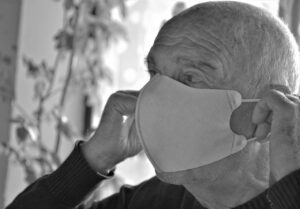How care home teams minimised the impact of Covid-19 on people living with dementia in care homes
World Alzheimer’s Day 2022
 At My Home Life England we are always learning about positive person-led approaches that support people living in care homes who have a form of dementia. We have had the privilege of working intensively with care home managers across the country during the pandemic, and this theme has shone through many of the stories and experiences people have shared with us over the last 18 months.
At My Home Life England we are always learning about positive person-led approaches that support people living in care homes who have a form of dementia. We have had the privilege of working intensively with care home managers across the country during the pandemic, and this theme has shone through many of the stories and experiences people have shared with us over the last 18 months.
The pandemic has been extremely difficult for all those living and working within care homes, including people living with dementia. Practitioners have told us:
- How seeing friends and staff in masks and aprons created anxiety and reduced communication.
- How being approached with a Covid-19 Test-kit felt scary to for people living with dementia.
- How hard it was to be denied a kiss and a cuddle from those that loved them.
- How people living with dementia picked up on the panic and vulnerability felt by care teams when guidance was poor and PPE absent.
- How lost they felt when they had to isolate in their own rooms.
One care home manager was told by an older woman within the home that at least during the second world war people had each other. This was far worse.
However despite the horrific situations care teams have found themselves in, we have heard incredible stories of people undertaking innovative efforts to support people living with dementia to maintain a sense of security, belonging and significance.
Skilled care home teams demonstrated courage and insight into those that they were caring for. They found ways to keep connections going and offered reassurance, despite worries for their own safety.
We heard how, for those in the later stages of dementia, staff used soft, soothing voices to blur out the panic and distress which upset the home environment. Team members placed visual prompts around the home to support people to understand the new measures in place, as well as customising PPE with personal touches so it didn’t appear as clinical. Recognising the importance of person-led care, others sang a person’s favourite song whilst supporting them to wash their hands and comply with infection control measures. Many others were supported to see familiar faces of friends and family on screens, when visitors were not allowed into the homes. For those at the end of their lives, staff members sat calmly alongside a person and offered comfort, often with limited external support.
The ‘enhanced health in care homes’ framework is also a change designed to support people who live and work in care homes and will hopefully lead to greater outcomes for people living with dementia.
It will be encouraging to see as an outcome of this framework a stronger sharing of expertise and innovation across care homes and the NHS to support individuals with a diagnosis of dementia, and also for more people living in care homes with dementia to have a diagnosis confirmed, recognised and recorded at their GP practice. Getting a correct diagnosis as early as possible is helpful for everyone involved in supporting an individual with dementia, including family, friends and paid carers, and gives the person the chance to explore what is available and begin planning for the future.